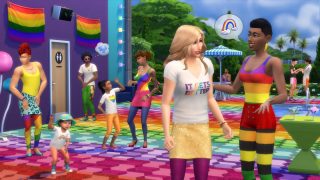Promoting Inclusion in Games Through ERGs
How EA is leveraging internal employee resource groups to drive inclusion
Building Healthy Communities

Starting at EA PLAY, we began a conversation with the community about what it takes to build a healthy community. For many, it involved tools and resources for reporting toxicity or giving the community a voice in how we address harassment and threats. But for others, it was about inclusion, and making sure there is a place for everyone who shares a passion for our games.
Two weeks ago at Sims Camp, we brought together 40 of our Sims Game Changers to participate in an open discussion about what inclusion means to them, and to hear from a few members of our development team about how the Maxis development team has worked to create inclusive experiences in The Sims 4. In addition, members of our Building Healthy Communities Player Council also participated to provide their perspective on creating inclusive games.

Working with ERGs and Partners to Enrich Content
A major focus of the discussion was about how Maxis, The Sims development team partnered with Employee Resource Groups (ERGs) - open, employee-led groups that unite around a common affinity or shared experience – to better incorporate cultural and diverse perspectives that enhance gameplay. Using ERGs is one component of the inclusion Framework, a set of guidelines created by our development teams that provides our developers with tools to create games that accurately reflect the diverse communities that play them.
A prime example of this approach has come to life in The Sims 4. As a game that promotes self-expression and individuality, our development team strives to deliver a dynamic gaming experience that is realistic and feels authentic to everyone.
When creating The Sims 4 and the additional content packs, developers began consulting various ERGs within EA to make sure they were understanding and accurately conveying cultural references when designing themed content. For example, in The Sims 4 Island Living Expansion Pack, developers collaborated with the Asian Pacific Islanders Represent (ASPIRE) ERG to ensure they were incorporating South Pacific/Polynesian-inspired components that would seem familiar to players of that background. Through ongoing conversations with the ERG, the team was inspired to design additional traditional clothing and tribal decorations, including a wooden spoon and fork as a household item, that have really resonated with players.
“It’s about the little details, asking our colleagues to provide feedback and insight into familiar items from home,” said Jill Johnson, Producer on The Sims 4. “The ERGs absolutely were a driving force in how we arranged some of the most special items in the expansion pack and provided the ‘gut check’ we often needed to ensure we’re representing something in a way that feels authentic to both the culture and The Sims brand.”

Another example is the celebration of Pride Month within The Sims 4 earlier this year. The development team partnered with It Gets Better Project to launch a number of Pride-inspired features in the game, including a variety of pride flags that represented different groups. The team consulted with the Pride ERG to make sure they knew what each flag meant and were being respectful to the different groups that these flags represented; this continued dialogue actually inspired two important additions to the selection.
“A lot of content creators care about the nitty gritty details - they want to rebuild their childhood home or have content that is familiar to them and their culture,” Sims Game Changer Negaoryx said. “There are so many people that haven’t been able to do that before without creating custom content. So for The Sims 4 team to be adding more inclusive content that represents people’s upbringings - the community on my channel is happy to see that.”

Using the Inclusion Framework, other development teams are also leveraging ERGs to help with game content. Need for Speed™ Heat, which just launched, takes place in Miami-inspired Palm City. The SOMOS ERG was crucial in helping the team develop a more authentic storyline by validating game scripts in Spanish, as well as providing feedback on character designs and dynamics to reflect Latin American culture. At the end of each process, when ERG colleagues are invited to see what developers have created, they’ve expressed their amazement at the level of detail and authenticity the development team has been able to incorporate into the game.
“As a company and a studio we wanted to create something compelling and real,” said Patrick Honnoraty, Producer for Need for Speed. “Working with the ERGs we were able to create something culturally sensitive and relevant that didn’t become a parody of itself.”
While our games are always evolving, our commitment to foster an inclusive and diverse community within and beyond the games remains the same. The Sims and Need for Speed are both longstanding franchises that continue to connect and engage people of different backgrounds from all over the world.
Lyndsay Pearson, General Manager of The Sims sums it up well. “We are fortunate that inclusion been a part of The Sims since day one. We are a global company and we make games for everybody.”
Stay in the conversation of all things EA: Read our blog, follow us on Twitter and Instagram, and Like us on Facebook.

